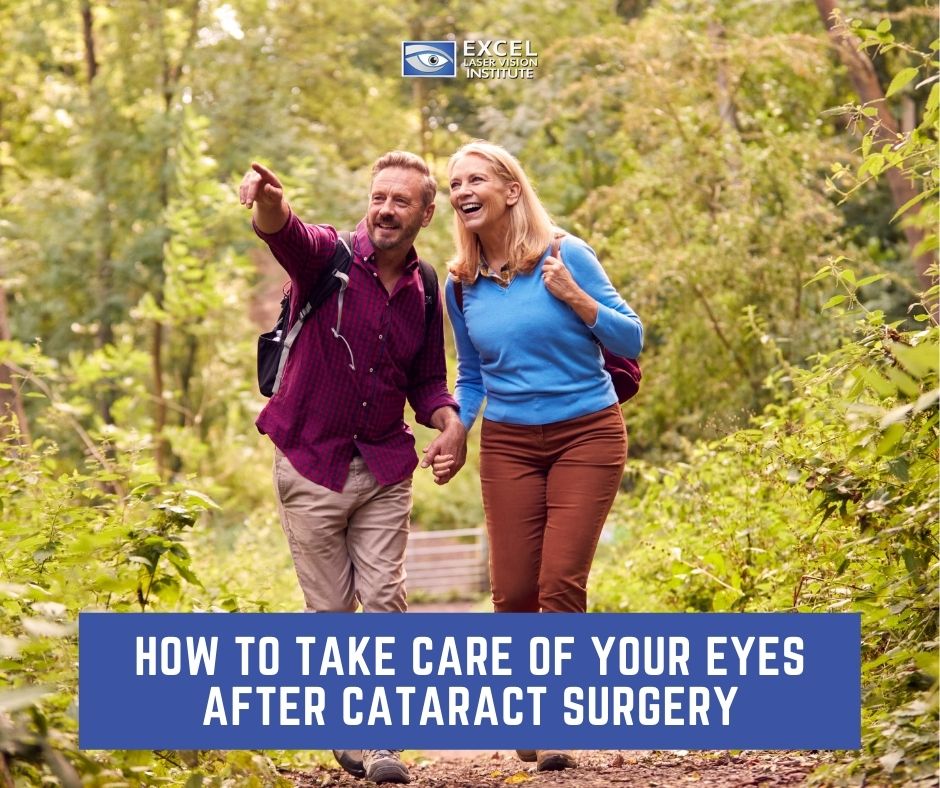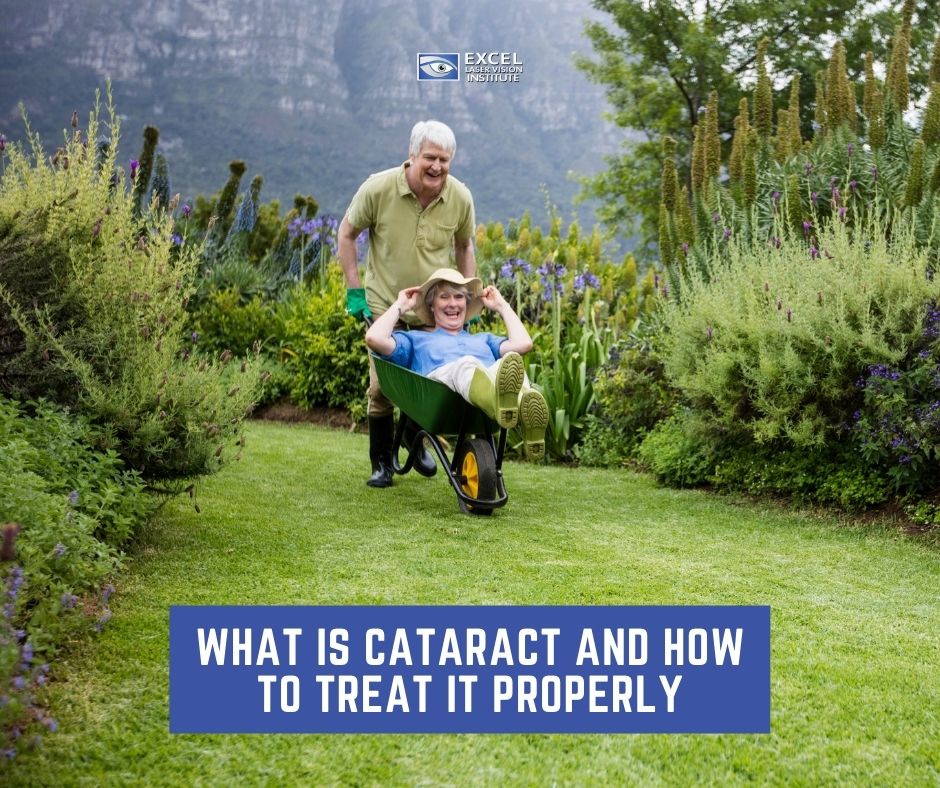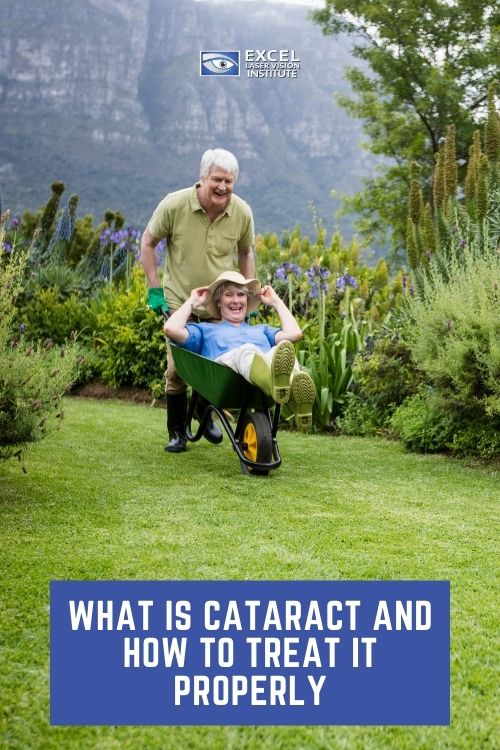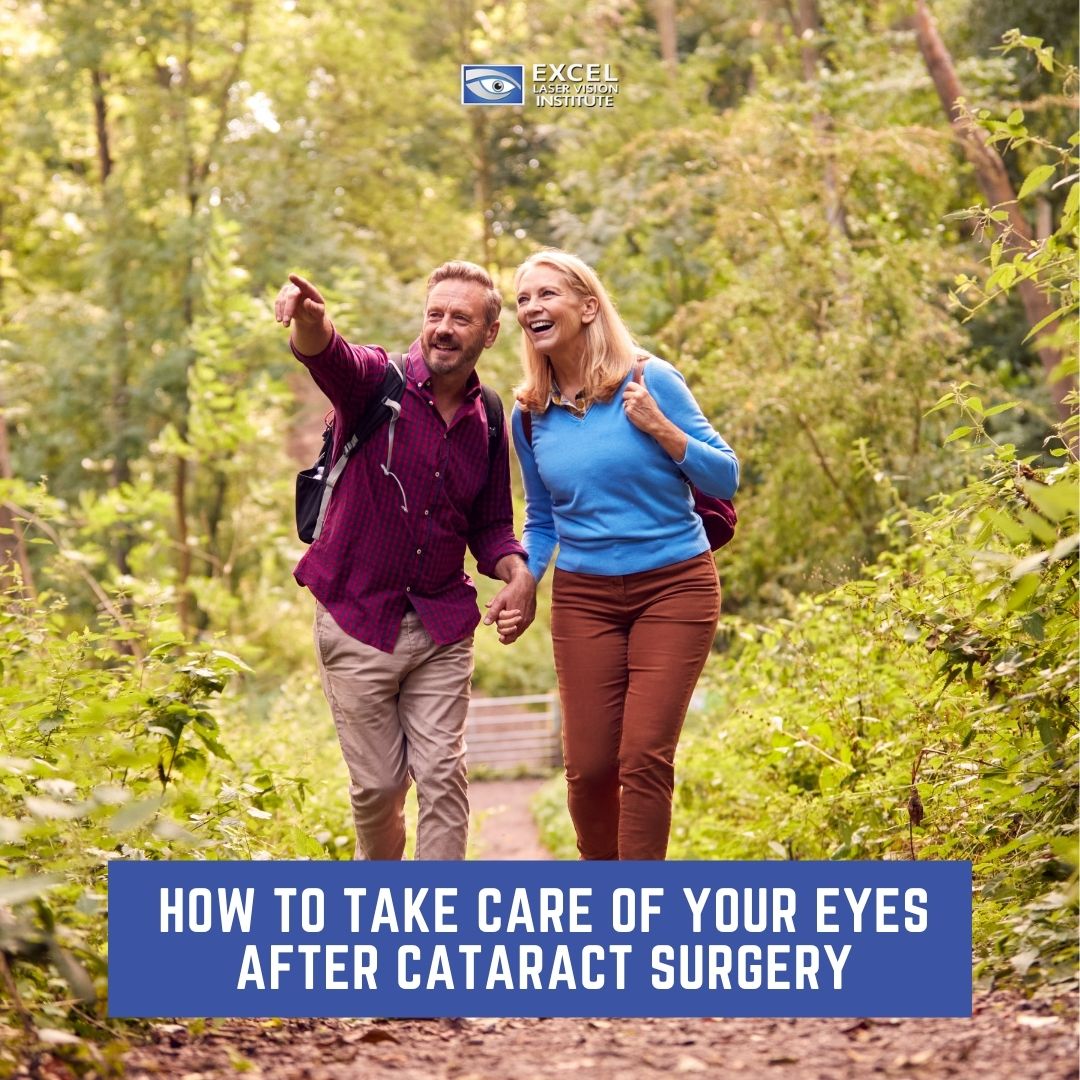
How To Take Care of Your Eyes After Cataract Surgery
The cataract surgeon in Los Angeles and Orange County tell us that cataract surgery is a very common surgery, and it usually takes about ten to thirty minutes to perform. Although the surgery is easy compared to other medical procedures, it’s still just as critical to take care of yourself post-surgery and give your eyes time to heal properly. Make sure you do your research and ask your surgeon some questions, especially what the recovery after surgery looks like and what it involves.
Before you meet up with your cataract surgeon at Excel Laser Vision Institute, read below what cataract surgery involves and how to best take care of your eyes after surgery.
What are Cataracts?
When an eye is infected with cataracts, there’s a cloudy film that forms over the eye’s lens and impairs a person’s vision. Cataracts can develop in one or both eyes. Some research has connected cataracts to diabetes, smoking, and alcohol abuse, but many are just a consequence of years of wear and tear to the eye.
What’s The Best Cataract Treatment?
In the beginning, patients with cataracts usually report mild symptoms that can easily be treated by glasses or contacts. However, cataracts are progressive, and as cataracts develop further, symptoms become more obvious and more challenging to treat with corrective eyewear. In the long run, the only method to effectively restore vision is to surgically replace the clouded lens with an artificial lens.
Once you know the eye surgery cost but you still feel that the concept of cataract surgery is nerve-racking, it may be encouraging to be reminded that based on information from the National Eye Institute that cataract removal is one of the safest, most effective, and most common operations performed in the United States. Around ninety percent of cataract cases report having better vision afterward.
What Does Cataract Surgery Involve?
The cataract surgeon in Los Angeles and Orange County replace the clouded lenses with intraocular lenses (IOLs). These lenses let patients receive clear vision again, usually with very limited requirements for contact lenses and eyeglasses. The procedure is carried out in thirty minutes and doesn’t require sutures.
What Happens After Cataract Surgery?
After your cataract surgery in Los Angeles or Orange County, you’ll most probably wait in a recovery room until the anesthesia starts to wear off. Even though you feel good enough to drive yourself home, the eye doctors will be strongly against this idea and recommend to all their patients to have a friend or family member drive them home after cataract surgery.
Besides the side effects of anesthesia, many people have clouded vision right after cataract surgery, which is the reason why doctors suggest you have someone else drive you home as a safety precaution.
Additionally, having a friend or family member by your side before the procedure is a good way to help you calm any nerves you may have. Also, this friend or family member can stay with you for the rest of the day as you recover.
You shouldn’t eat or drink before the surgery. Your cataract surgeon will inform you on how many hours before surgery you should stop eating and drinking. Furthermore, don’t forget to remove any contact lenses before surgery, and also removing make-up is highly recommended.
How To Take Care Of Your Eyes After Cataract Surgery?
Once you arrive home after cataract surgery, you should just take it easy. Get as much rest as you can. Eye doctors even tell their patients to take a nap when they get home if they can. If you see any bruising around the eye from the anesthesia, or popped blood vessels from the pressure your eyes went through, don’t be concerned. These side effects should go away on their own within a few days.
After you’ve had a good rest of at least a couple of hours at home, you can go ahead and watch some television, bathe or shower, and work on the computer. However, you should avoid swimming pools and hot tubs for up to one week. Over the next few weeks, you shouldn’t do activities that may result in getting dirt or dust in your eyes, such as dusting or gardening.
Furthermore, doctors usually advise patients to avoid cooking for at least a week after cataract surgery. The reason being is that cooking could irritate your eyes as they recover from cataract surgery. As you cook, steam and water could get to your eyes. Although this is not something you would normally be concerned about, it’s important that your eyes don’t become wet for a week after cataract surgery. Plus, patients are also told to avoid extreme heat, something that exists when cooking. Because of the above explanations, you shouldn’t cook for at least a week after cataract surgery.
Make Sure To Take Your Medications
If your eye doctor prescribed antibiotic eye drops, take them for the entire course as prescribed, even if your eyes feel normal. The eye drops help the healing process and help hinder infection. You’ll have to attend several visits with your ophthalmologist in the next few days and weeks after cataract surgery. Your doctor will examine your eyes to confirm that everything is healing as expected. Also, you will be fitted with a new pair of glasses, if you need them.
You should do your best to follow the instructions above to make sure your cataract surgery goes ahead smoothly without or with very few complications to worry about. This will help you recover much faster and help you get back to your normal routine quicker. If you have any particular questions about getting over cataract surgery, the teams at Excel Laser Vision Institute’s Los Angeles and Orange County clinics are ready and happy to answer them.

What Is Cataracts And How to Treat It Properly
The Cataract surgeon in Los Angeles and Orange County tells us that there is a natural lens inside our eyes. This lens bends (refracts) light rays that enter the eye to help us see. As any eye doctor can tell you, the lens should be clear.
What Are The Vision Problems You Can Experience With Cataracts
When there is a cataract in the eye, the lens becomes cloudy. The person affected by the cataract may describe how they see as if they are looking through a foggy or dusty car windshield. Objects appear blurry, hazy, or less colorful with a cataract.
What Are The Symptoms Of Cataracts?
Below are some vision changes you may observe if you have a cataract:
Blurry vision
You see a double or a ghosted image out of the eye with cataract
Feeling extra sensitive to light (particularly with oncoming headlights at night)
Having problems seeing well at night or requiring more light when you read
You see bright colors as faded or yellow instead
If you notice these cataract symptoms, talk to your cataract surgeon in Los Angeles or Orange County.
What Causes Cataracts?
The cataract surgeons in Los Angeles inform us that aging is the most common cause of cataracts. This is because of normal eye changes that start to occur after 40. Around this time, normal proteins in the lens begin to break down. This is what the best laser eye surgeon say causes the lens to get cloudy. People who are over the age of sixty usually begin to have some clouding of their lenses. Nevertheless, vision issues may not occur until years later.
Here are a few other reasons why you may get cataracts:
You have parents, brothers, sisters, or other family members who have cataracts.
You have particular medical problems, such as diabetes.
You smoke.
You have had an eye injury, eye surgery, or radiation treatments on your upper body.
You have spent a lot of time in the sun, especially without sunglasses that protect your eyes from damaging ultraviolet (UV) rays
You use certain medications, such as corticosteroids, which may cause the early formation of cataracts.
Most age-related cataracts develop slowly. Other types of cataracts can progress more quickly. For instance, those in younger people or those in people with diabetes. Doctors cannot foresee how quickly a person’s cataract will develop.
You Can Slow Down The Advancement Of Cataracts
You can probably decelerate the development of cataracts. Doctors recommend that you should protect your eyes from sunlight. The best method to do this is with sunglasses. Wear sunglasses that block out the sun’s ultraviolet (UV) light rays. Also, you can wear eyeglasses that have a clear, anti-UV coating. Discuss with your ophthalmologist to find out more.
Cataract Diagnosis
Typically, an eye doctor will examine and test your eyes to make a cataract diagnosis. This thorough eye exam includes dilation, which means the doctor will use eye drops to open up the pupils.
Slit-lamp exam
The ophthalmologist will examine the cornea, iris, lens, and the other areas located at the front of the eye. The special slit-lamp microscope makes it simpler to find abnormalities.
Retinal exam
When your eye is dilated, the pupil is widened, the doctor can see the back of the eye more clearly. The doctor uses a slit lamp, an ophthalmoscope or both to look for signs of cataract. Also, an ophthalmologist will check for glaucoma and take a look at the optic nerve and retina.
Refraction and visual acuity test
This test checks the sharpness and clarity of a person’s vision. Each eye is tested on its own for the ability to see letters of varying sizes.
What Do Cataracts Look Like?
Cataracts appear in many different forms and develop for many various reasons. Here are a few types of cataracts.
Mature Cataract (Nuclear)
A mature cataract is when the cataract has become large and dense. When there is a mature cataract, the eye’s lens is opaque, which means you can’t see through it, and there is severely limited vision. This type of cataract is a nuclear cataract, which means it begins deep in the center of the lens (nucleus).
Congenital Cataract
A congenital cataract is when it is found in a baby’s eye at birth. Children’s eyes and vision keep developing until they are about ten years old. If a congenital cataract is not treated early, a child’s vision can be affected for life.
Diabetic Snowflake Cataract
Individuals with diabetes mellitus are at a higher risk of developing cataracts. Uncontrolled levels of blood sugar cause changes in the eye’s lens. Normally, people with uncontrolled diabetes have a diabetic or “snowflake” cataract. The eye has a grayish-white starburst or snowflake appearance.
Traumatic Cataract
Also, a cataract can develop due to trauma to the eye, either by blunt force such as a blow to the eye or something that penetrates the eye. A cataract can be seen as the cloudy, white area in the middle of the eye, and part of the iris is separated (see the brownish-orange area on the right side). Thousands of eye injuries happen every day, yet nine out of ten of them are preventable by wearing proper safety eyewear.
After A Cataract Diagnosis, What Should I Do?
Have an eye exam every year if you’re older than 65, or every two years if younger.
Protect your eyes from UV light by wearing sunglasses that block at least 99 percent UV and a hat.
Quit smoking. Smoking is a main risk factor for cataracts.
When reading or doing other activities use brighter lights. If you want, you can also use a magnifying glass.
Do not drive at night when night vision, halos or glare become issues.
Take care of any other health issues, particularly diabetes.
Get suitable eyeglasses or contact lenses to correct your vision.
When it becomes difficult to complete your regular activities, think about cataract surgery.
Make an informed decision about cataract surgery. Have a discussion with your ophthalmologist about:
the surgery
preparation for and recovery after surgery
advantages and possible complications of cataract surgery
cataract surgery costs
other questions you have
How Can You Treat Cataracts?
You can only get rid of cataracts through surgery. If you can live with your cataract symptoms, you may need a new eyeglass prescription to help you see better. It would be best to think about surgery when cataracts hinder you from doing your daily routine or things you want to do.
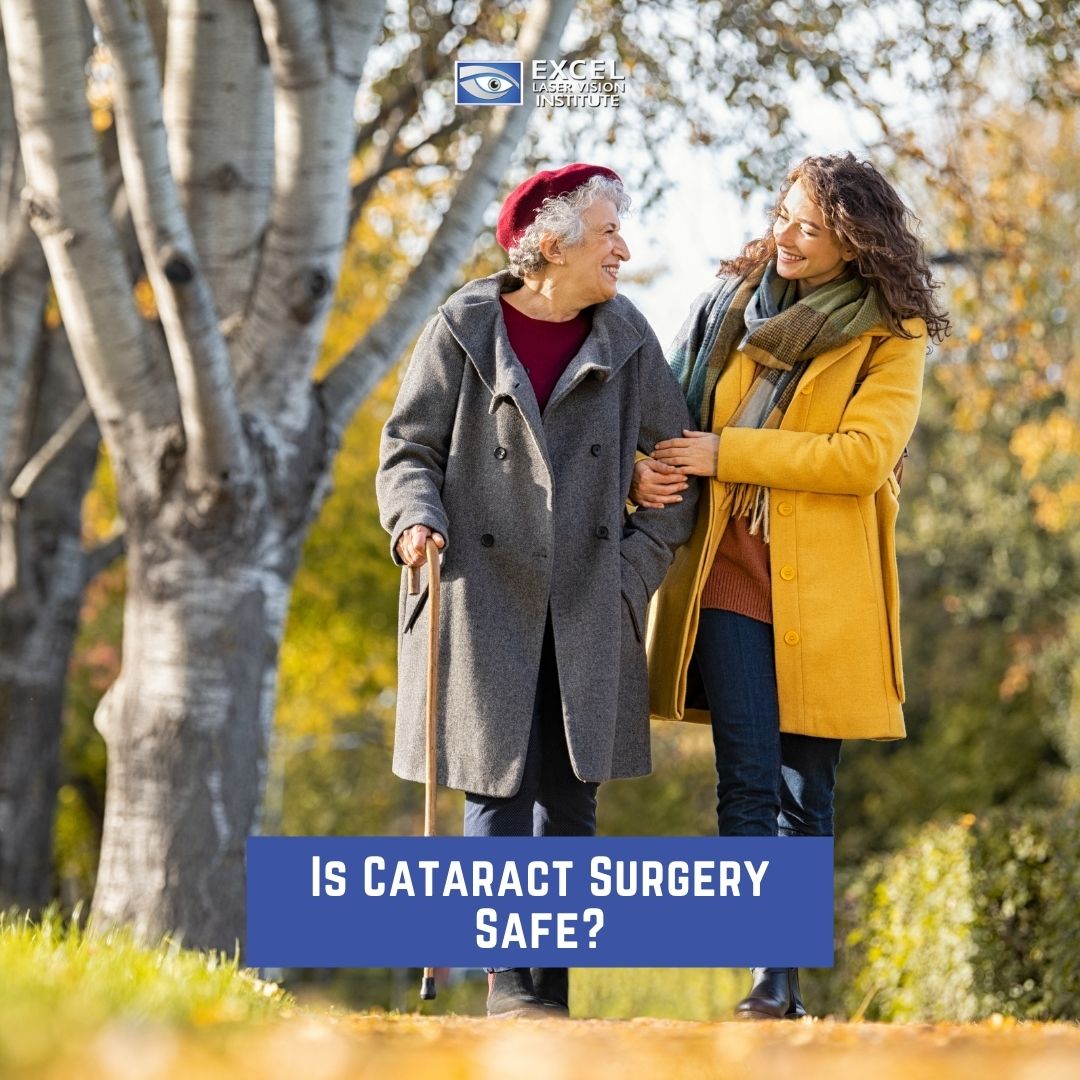
Is Cataract Surgery Safe?
If you have cataracts, you may probably need cataract surgery in Orange County or Los Angeles. It’s a procedure that stores cataract-related vision loss. When your surgeon performs the corrective eye surgery, the clouded lens inside your eye gets replaced with a clear artificial lens. The procedure is entirely painless, and it typically takes around 15 minutes. Normally, it’s an outpatient procedure and you don’t have to stay overnight at the hospital according to the cataract surgeon in Los Angeles and Orange County.
At first, some patients think cataract surgery is scary. However, it’s one of the most risk-free and efficient vision surgeries around today. Every year, millions of cataract surgeries are carried out in the U.S., and many individuals have excellent results. The more senior a person is, the higher the potential need for cataract eye surgery since cataracts usually develop or worsen.
Based on facts from the National Institutes of Health (NIH), cataracts affect
Around 1 in 20 of people aged 50-54
An estimated half of people aged between 75 to 79
More than 2 in 3 people over the age of 80
What Does Cataract Surgery Involve?
The cataract eye surgeon in Orange County and Los Angeles will remove the cloudy lens inside your eye and replace it with a clear artificial lens during surgery. The device that’s used is called an intraocular lens, or IOL for short.
An IOL restores the clear vision you had before the cataracts developed. During any cataract removal in Los Angeles or Orange County, special safety measures are taken to ensure the patient is as pain-free and relaxed as possible. The most a patient will experience is a slight feeling of pressure, but this sensation isn’t painful.
A modern cataract surgery procedure will usually follow these actions:
The surgeon creates a small incision along the side of the cornea.
A high-frequency ultrasound device or laser is utilized to break up the cloudy lens into small fragments carefully.
The lens fragments are carefully removed from the eye using a suction device.
Once all the fragments have been removed, the surgeon puts in the IOL behind the pupil and the colored part of the eye, the iris, in the same place your natural lens used to be.
The incision doesn’t require any stitches to heal.
Your eye surgeon will put a protective shield over your eye to keep it safe during the early stages of recovery.
If you require surgery in both eyes, your cataract surgeon will typically wait for one to three weeks between procedures to allow the first eye to heal.
What Are The Two Different Options For Cataract Surgery?
When you ask for cataract eye surgery cost, you want to know what options you have available for cataract surgery. The most familiar type of cataract removal surgery is known as phacoemulsification, or phaco for short. A phacoemulsification procedure involves high-frequency ultrasound waves to break up the cloudy lens.
Currently, the phaco operation is performed with smaller incisions than ever before, so healing is faster with a much lower risk of complications.
Three main kinds of IOL can be implanted during cataract surgery:
Monofocal lenses – One of the most common options for most surgeries. These may still need the use of eyeglasses or reading glasses after the corrective eye surgery. If prescription glasses are required, your ophthalmologist will prescribe them about a month after surgery. Optionally, presbyopia can be treated by modifying the power of one of your monofocal IOLs to create a condition called monovision.
Accommodating lenses and multifocal lenses – Convenient for individuals who have presbyopia. These lenses can correct your reading vision without surrendering your distance vision. Both of these IOLs offer a huge range of vision after cataract surgery than traditional monofocal lenses.
Extracapsular surgery – rather than break up the cloudy lens with an ultrasound, an eye surgeon will take out the core in one piece, then the rest with a suction device. Extracapsular surgery consists of a longer incision, and antibiotic eye drops before the procedure. This type of cataract surgery procedure is usually only carried out in complicated cases.
Laser cataract surgery, or Refractive Laser-Assisted Cataract Surgery (ReLACS), is more contemporary option that utilizes more advanced technology.
Instead of ultrasound energy, a specialized laser is brought in to disrupt the existing cataract. The laser doesn’t need as much energy as an ultrasound, which can lower the risk of complications even more.
In some instances, laser surgery can also enhance visual outcomes.
Laser surgery is usually more pricey than standard phaco cataract surgery. During your cataract removal consultation, your eye surgeon can help you understand which procedure is the most suitable for your individual requirements.
How To Get Ready For Cataract Surgery?
Prior to your scheduled cataract surgery, your eye doctor will carry out a thorough eye exam to evaluate the overall health of your eyes and figure out if anything will prevent you from having surgery.
Also, the ophthalmologist will carry out a refraction test to find out if you’re nearsighted, farsighted, and/or astigmatic prior to surgery. Other measurements of your eyes will be taken to determine the shape of your eye and which type of implantable lens you’ll require.
Before your eye surgery, the medical team will advise you on what to expect before, during and after your procedure. This information will help you to make an informed decision about going forward with surgery.
Your eye doctor will discuss with you any medications and supplements you’re on. Some of these can boost your risk of complications and may need to be stopped for a short time
If you have any queries or concerns about cataract surgery, make sure you talk about them with your cataract surgeon and optometric physician before signing the “informed consent” documents that authorize surgery.
At Excel Laser Vision Institute, we have a team of experienced and dedicated staff easily answer all of your questions and put you at ease about your corrective eye surgery. We only use cutting-edge laser technology to perform cataract surgery, and other vision correction alternatives. Our Harvard-trained surgeon, Dr. Moosa, serves at our Orange County as well as at the Los Angeles offices. Once we assess your prescription and eye health, we can talk about which eye correction treatment is best for you, financing, and the next steps. Begin your journey towards a clear vision that eliminates your dependence on eyeglasses and contact lenses today.
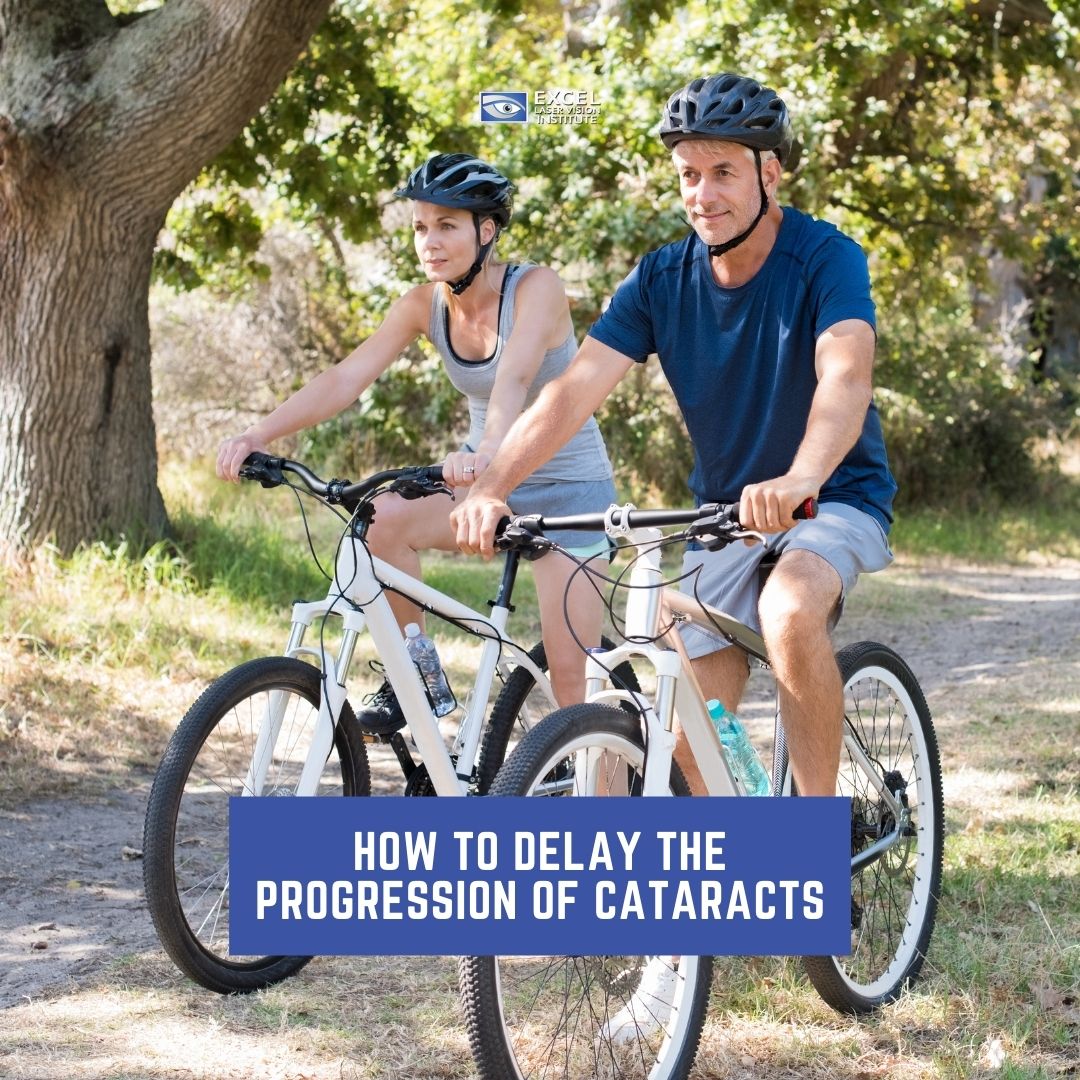
How To Delay The Progression Of Cataracts
Patients often ask whether there is a way of delaying cataracts since they may have a family member who has it. Laser eye surgery doctors in Los Angeles tell us that cataracts are the leading cause of blindness in the United States. Unfortunately, there is no guaranteed way to prevent them, but making some lifestyle changes could reduce your risk of getting them.
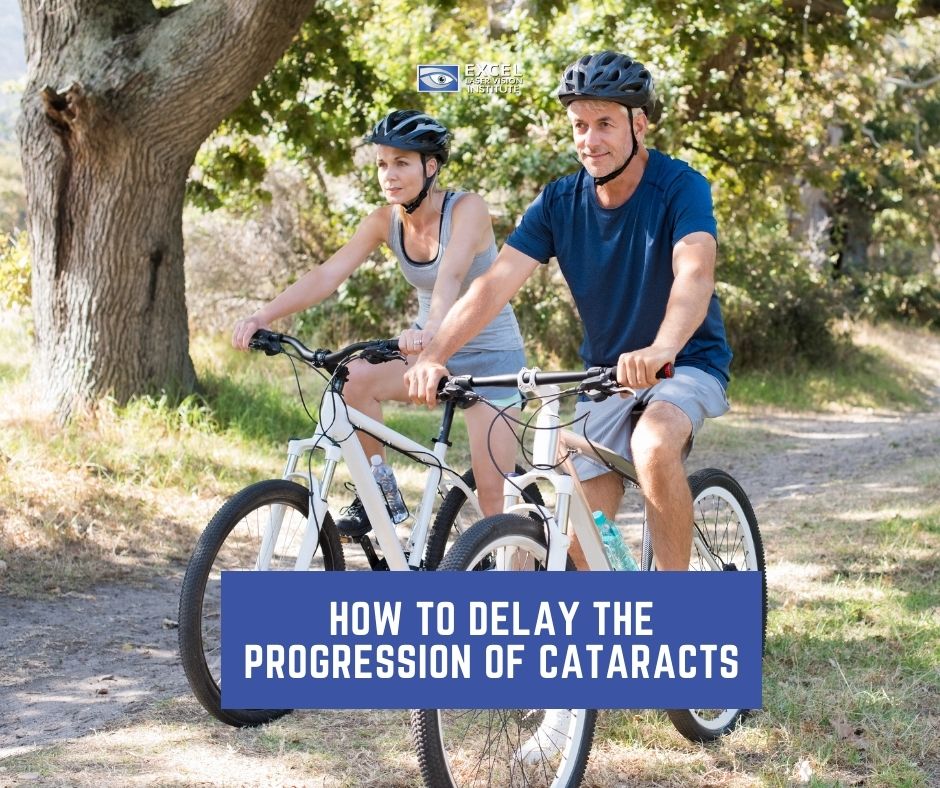
How Do Cataracts Happen?
The doctor at Excel Laser Vision Institute, a LASIK eye center in Los Angeles, points out that the real reason why medical professionals can’t find a way to delay cataracts is that it is more complicated than keeping a clear lens from becoming cloudy. So, the whole point isn’t about keeping the lens clear but more about how to stop it from aging. For now, scientists haven’t found a way to delay aging. However, they have a good idea of what causes it biochemically. And the same can be said for cataracts.
Every year, the lens in your eye lays down new layers, kind of like how a tree lays down new rings each year. Over time, the center of the lens gets more compressed, and it results in hardening and cloudiness. There is a type of biochemical bond referred to as a disulfide bond, and it occurs between the cysteine amino acids of the crystalline proteins in the eye. LASIK eye surgeons in Los Angeles confirm that there is no way to stop it or delay it.
How Do You Prevent Cataracts From Getting Worse?
Nevertheless, Doctor Moosa, a LASIK surgeon in Los Angeles, gives us five ways to prevent cataracts or keep them from getting worse. These methods are not difficult to incorporate into a healthy lifestyle, but they can possibly prevent you from becoming blind.
Stay Away From Lengthy Exposure To UV Light
Although a small amount of exposure to the sun is healthy, prolonged exposure to the sun’s ultraviolet rays can intensify cataract progression.
This doesn’t mean you have to lock yourself indoors most of the time. It is okay to go out as long as you protect yourself from the dangers of prolonged exposure to ultraviolet light.
When the sun is out, and you want to be outside, make it a point to wear sunglasses. As mentioned above, lowering the amount of ultraviolet light that reaches your eyes will help you prevent getting cataracts.
Also, don’t be fooled when there is a cloudy day since the sun’s rays can pass through thin clouds. The peak hours of the day for sun exposure are between 10 am, and 3 pm or else 11 am and 4 pm daylight savings time.
Don’t Use Steroid Drops
Sometimes ophthalmologists will prescribe steroid eye drops to treat dry eyes and arthritic flare-ups in the eyes. These steroids imitate the effects of cortisol in the body to lower inflammation.
Although steroid eye drops are useful when administered properly, they can have damaging side effects, which consist of the acceleration of cataracts.
If you do have to use steroid eye drops on a regular basis, you should have regular eye exams carried out. If you notice cataracts developing, speak to your optometrist or ophthalmologist as soon as possible.
Look Out For Medicinal Side Effects
Commonly prescribed medications have side effects that could trigger the cataract progress. If you are at risk for cataracts and take medication on a regular basis, ask your medical professional about any side effects you have to be aware of.
If you are taking necessary medication that could speed up cataracts, it is crucial that you avoid sunlight during peak hours, wear sunglasses or a hat during sunny days, and have regular eye exams.
Taking medication to enhance your life may not be worthwhile if it results in cataracts. So, think about your options carefully.
Think About Cataract Surgery
When cataracts have already set or progressed to a point where it disrupts many aspects of your life, you should think about having cataracts removed.
You can only remove it through cataract surgery, a process that involves removing your eye’s natural cloudy lens and replacing it with an artificial lens. One of the leading eye surgeons at Excel Eye Institute will discuss and advise you of the options for corrective lenses that are appropriate for you.
This is the best way to treat cataracts that have already set in, but it may not be the best solution for everyone. Make sure to contact your laser eye clinic to figure out if cataract surgery is the right option for you.
Live A Healthy Lifestyle
Research has shown that a healthy lifestyle can lead to reducing the development of cataracts.
And this is a very logical finding since a healthy lifestyle helps to fight against many ailments. But, what exactly comprises a “healthy lifestyle”?
Here are a few suggestions from existing studies:
Diet Guidelines
- People who have a diet that consists of colorful fruits, vegetables, and whole grains may show a reduced possibility of developing cataracts.
- Studies suggest that antioxidant vitamins in these fruits and vegetables may lower the risk of cataracts.
- Carrots are a great source of beta-carotene, which is converted into vitamin A in the body and is excellent for eye health.
- The consumption of fish has been linked to a reduced risk of cataracts.
- Fish are high in omega-3 fatty acids, which have been known to reduce cataract progression.
- A diet high in carbohydrates may speed up cataract progression.
- Foods that are rich in a variety of vitamins and minerals may delay cataracts.
Lifestyle Guidelines
- Dehydration can quicken the development of cataracts.
- Alcohol may accelerate the development of cataracts.
- Smoking will increase the chance of developing cataracts.
- Obesity may increase the chances of developing cataracts.
- Individuals with diabetes may be at a higher risk of developing cataracts.
Many people over the age of 50 will eventually develop age-related changes in their lenses, known as “early cataracts.” It may be challenging to prevent cataracts from progressing entirely, but you could live cataract-free by taking account of these guidelines.

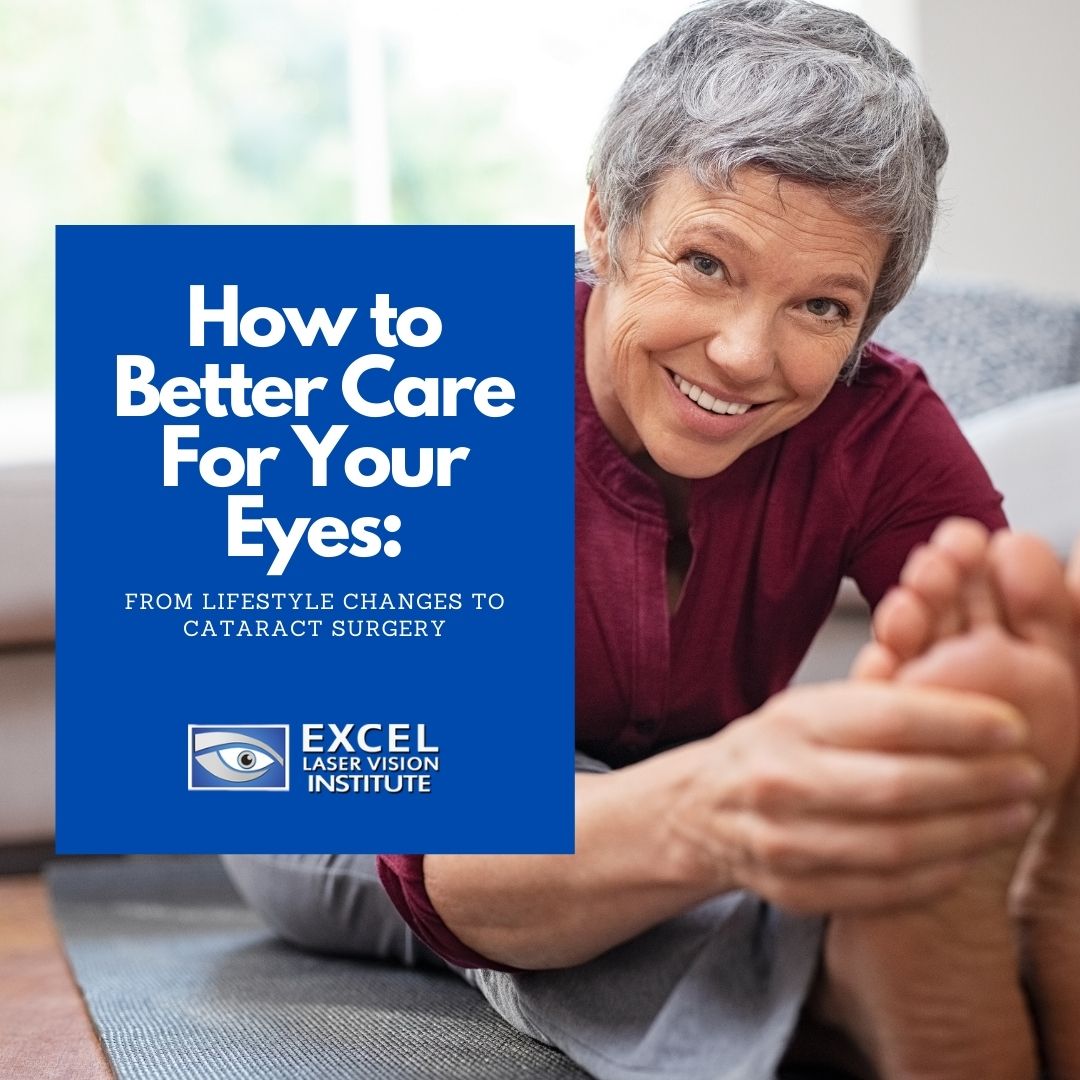
How to Better Care For Your Eyes: From Lifestyle Changes to Cataract Surgery
It’s easy to take our eyes for granted. Every day of our lives we rely on our vision, from the most baseline activities to our passions and work. Very often, people forget how important this is until some part of their eyesight is compromised. Fortunately, technology can help us out when this happens. Procedures like LASIK and cataract surgery in Los Angeles allow people to regain clarity of sight and move forward with their lives.
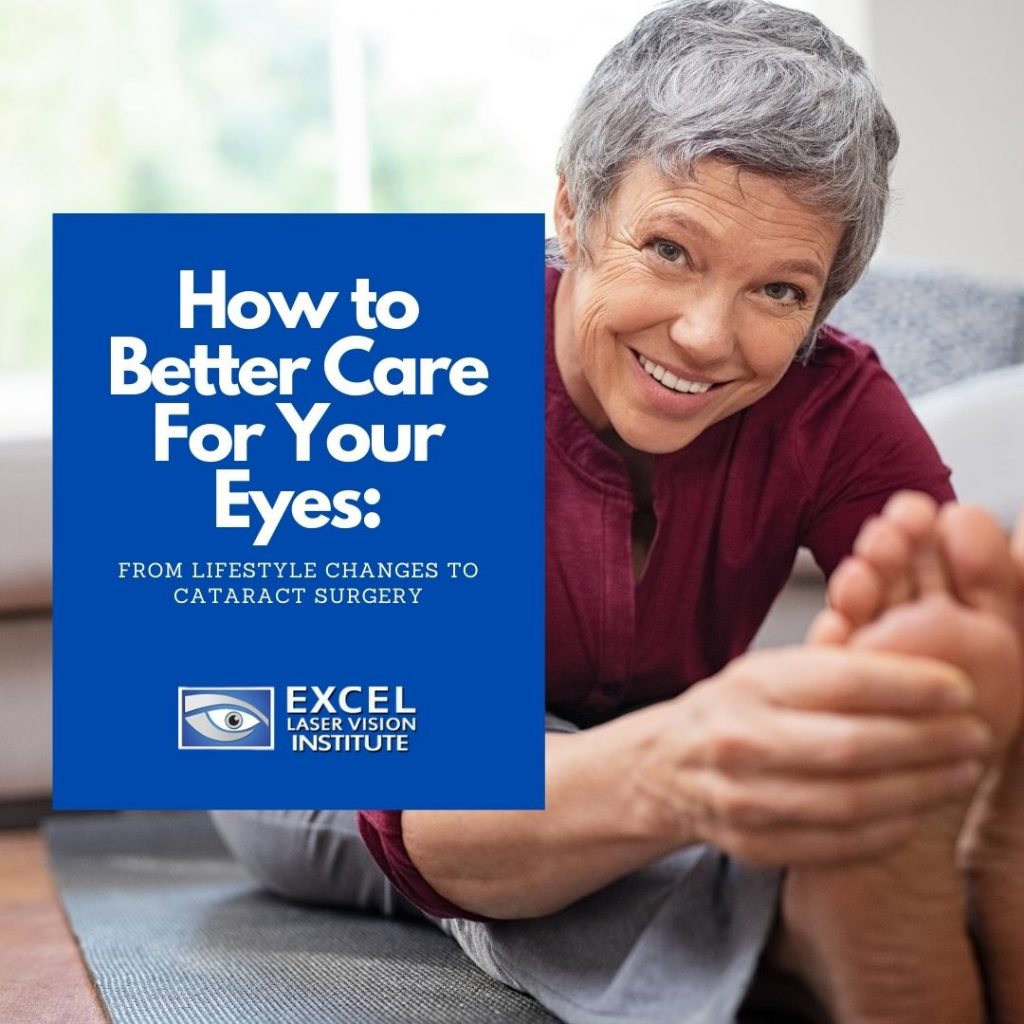
Since our eyes contribute so much to our quality of life, we have to maintain ocular health in order to maintain ocular function. This is true for almost anyone, regardless of measured visual acuity. Those looking into laser vision correction in Los Angeles need healthy eyes just as much as people who have never worn a corrective lens in their life. Here are some of the ways that we can take better care of our eyes:
Eating a well-balanced diet
Diet affects nearly every aspect of our health, including our eyes. There are certain foods that will promote healthy eyes such as green leafy vegetables and yellow vegetables. Fruits that are high in vitamin C can contribute to healthy blood vessels and combat cataracts. Omega 3 fatty acids have been shown to improve eye pressure and reduce the risk of glaucoma. These can be found in halibut, salmon, and tuna.
Getting enough exercise
According to corrective eye surgery experts, exercise can play a large role in eye health as well. Many people don’t realize that conditions such as high blood pressure, high cholesterol, and diabetes can often lead to chronic eye issues that damage vision. In order to lower your risk of developing these problems, it is imperative that you follow regular health-conscious practices according to your personal needs.
Protecting your eyes from the sun
Many patients who receive cataract surgery in Los Angeles have been told that UVA and UVB protection is the key to preventing cataract development. While spending time outside is great for most people’s health, it is important to limit sun exposure to the eyes. Other eye conditions that can develop as a result of harmful sun rays are corneal growths, keratitis, and age-related macular degeneration.
Filtering blue light
In this digital age that we live in, it’s hard to get away from screens. We are constantly on our phones, tablets, and computers. Then, when we get home, we watch TV. Unfortunately, these screens emit a high energy blue light that can damage eyes over time. The best way to offset this exposure is to take supplements like zeaxanthin and lutein. You can also take frequent breaks to look at something off the screen and blink more often.
Practicing good ocular hygiene
There are certain things that we do without thinking and one of those is touching our eyes. Whether we feel an itch or we are adjusting our contacts, it’s easy to reach up and rub around the area without thinking. However, our eyes are very sensitive and require the utmost care at all times. In order to protect your eyes from any irritants, it is important to always wash your hands before making contact with them and never use rough motions.
Getting laser eye surgery
It’s important to understand our limitations when it comes to eyesight. If you are someone who has worn contacts and glasses all your life or most of your life, then you know that having a refractive error can affect your day to day life. Fortunately, advancements in technology and ocular knowledge have allowed us access to procedures like LASIK. This vision correction alternative is a long-term solution that often eliminates the need for contacts or glasses entirely. For people with contact lens intolerance or who often suffer from fogged up glasses, this is life-changing. Contact a LASIK clinic near you to schedule a consultation with a surgeon. You can ask them questions like, “How much does LASIK cost?” and “How long does LASIK last?” They will walk you through every aspect of the procedure and determine whether or not you qualify for this form of vision correction.
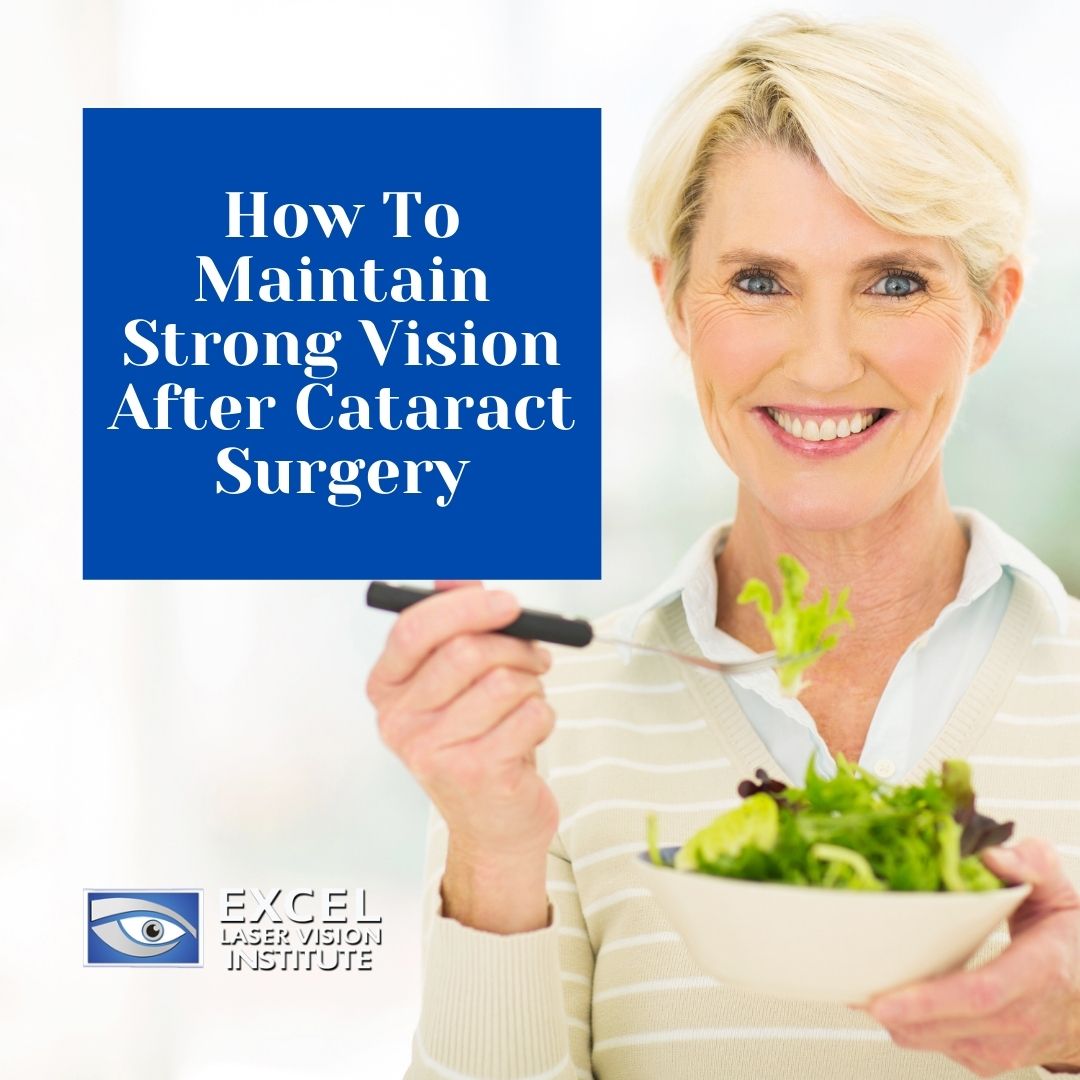
How To Maintain Strong Vision After Cataract Surgery
Usually, the first thing that happens to people after getting cataract surgery is that they feel relieved. With cataracts gone, their vision is restored and they can see incredibly well. However, this feeling of relief is often followed by a desire to keep their visual acuity at this level. During this time, people are motivated to do what it takes in order to keep their vision strong, including eating well, exercising, eliminating any tobacco, wearing UV protection, and monitoring other health conditions.
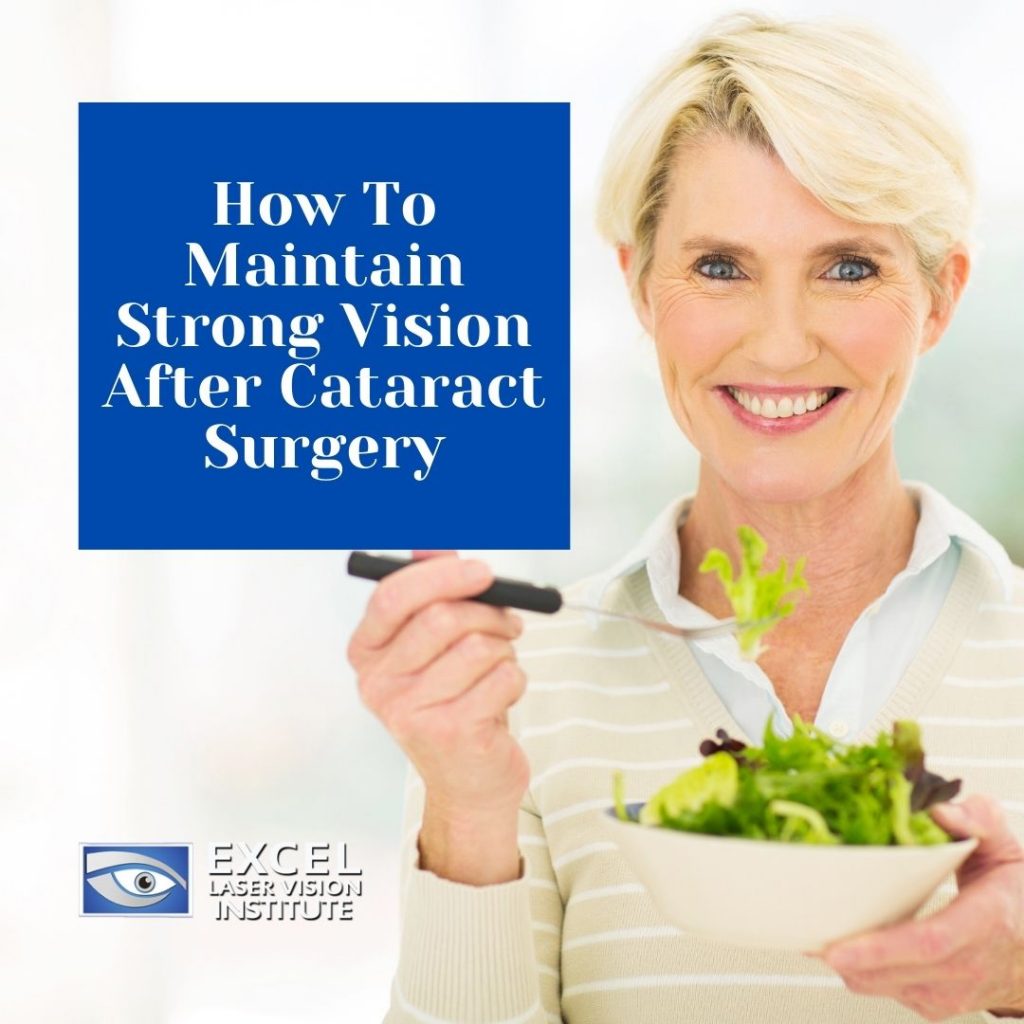
Cataract surgery can significantly improve a person’s vision by replacing a clouded lens with a clear, artificial one. This new lens can help light rays better reach the retina and, therefore, achieve clarity of vision. This corrective eye surgery is common for people that are prone to age related macular degeneration. According to eye care experts, macular degeneration can be triggered by cumulative oxidative stress to the macula, which is in the center of the retina. In order to prevent age related macular degeneration from backtracking the success of cataract surgery, a patient must focus on their macula health.
The very center of the macula, known as the fovea, is responsible for five degrees of vision as well as facial recognition and reading. The fovea also holds three macular pigments ( meso-zeaxanthin, zeaxanthin, and lutein) which work to filter short-wavelength blue light and have antioxidant properties. The denser the macular pigment, the more capable it is of protecting retina cells from oxidative stress and harmful blue light. This contributes to overall better quality of vision, especially in low light situations.
The best way to reduce your risk of getting age related macular degeneration is to treat your body with the right nutrients and supplements. You can find zeaxanthin and lutein in foods like corn, carrots, leafy vegetables, and citrus fruits. According to laser vision correction experts in Los Angeles like Doctor Moosa, meso-zeaxanthin is harder to find in a Western diet and, therefore many people are deficient in this macular pigment. Fortunately, there are many natural, food-based supplements that one can take to increase their meso-zeaxanthin. This can improve visual functions and contrast sensitivity.
Visual deterioration is a common symptom of age. This is why so many people face conditions like cataracts, macular degeneration, glaucoma, presbyopia, temporal arteritis, and dry eye. However, many people are able to restore their vision through healthy habits and corrective procedures. Eye care experts recommend taking dietary supplements to protect against oxidative damage and getting cataract surgery to replace cloudy natural lenses. As long as people stay on top of their eye health, they will be able to prevent more serious conditions from affecting their vision. One of the easiest ways to maintain eye health is to schedule yearly check-ups and share any occurring symptoms that you may have noticed with your doctor.
Once achieving clarity of vision, people are more equipped to go about their daily lives, chase their passions, and improve their overall quality of life. In order to determine if you qualify for cataract surgery or any other vision corrective procedure, visit an eye care clinic like Excel Laser Vision Institute in Los Angeles and schedule a comprehensive exam.
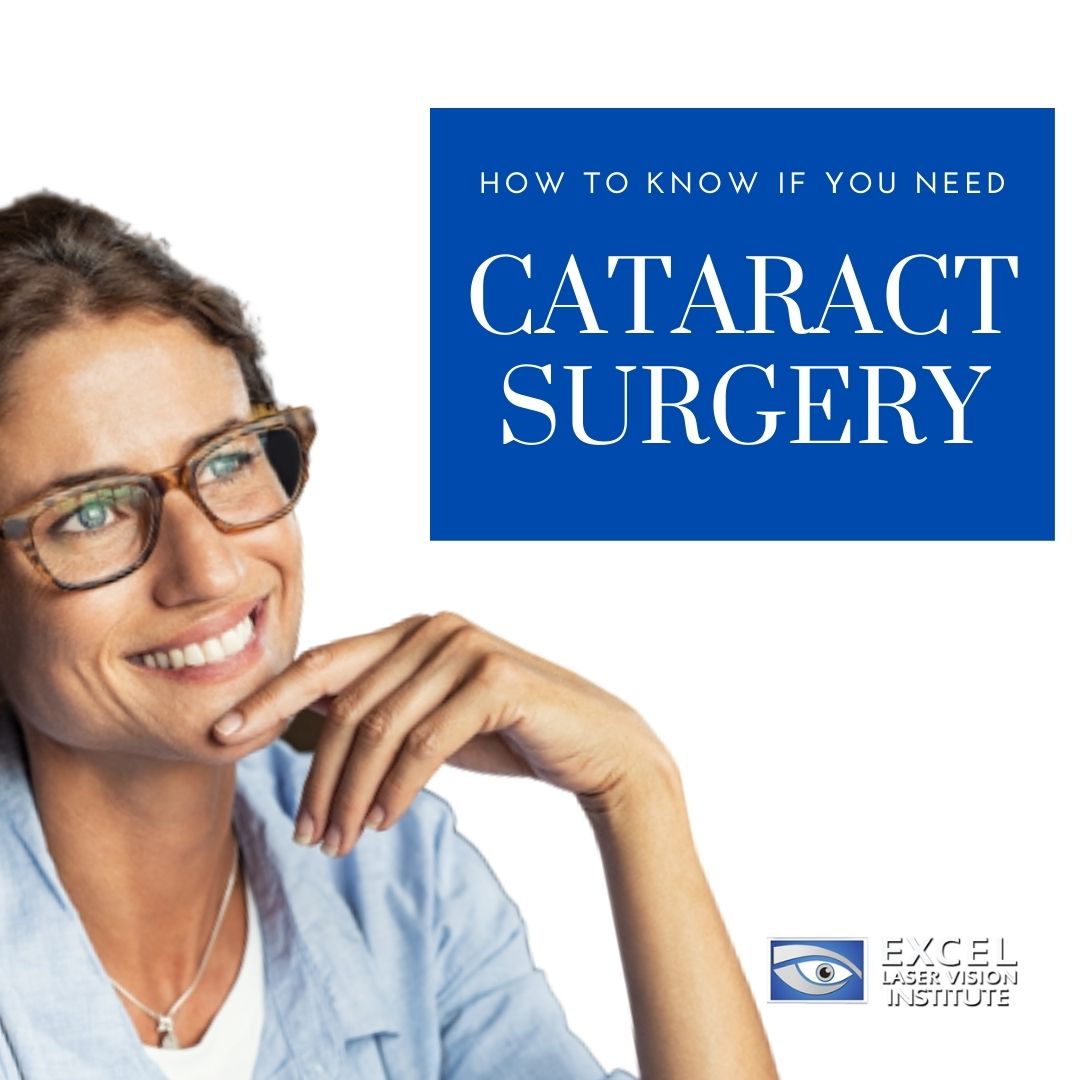
How to Know if You Need Cataract Surgery
According to eye care experts in Los Angeles, cataract surgery is a procedure that involves replacing the eye’s natural cloudy lens with a clear synthetic lens. This can be performed by experienced surgeons on an outpatient basis under local anesthesia. Many cataract surgery patients can return to their normal routines within a few days. Fortunately, advancement in technology has allowed this procedure’s success rate to skyrocket and the results are long-lasting. Eye care professionals highly recommend the procedure for people who are suffering from cataracts. However, patients must make a couple of decisions when beginning their journey, including what type of lens implant they want and when they want to have the surgery.
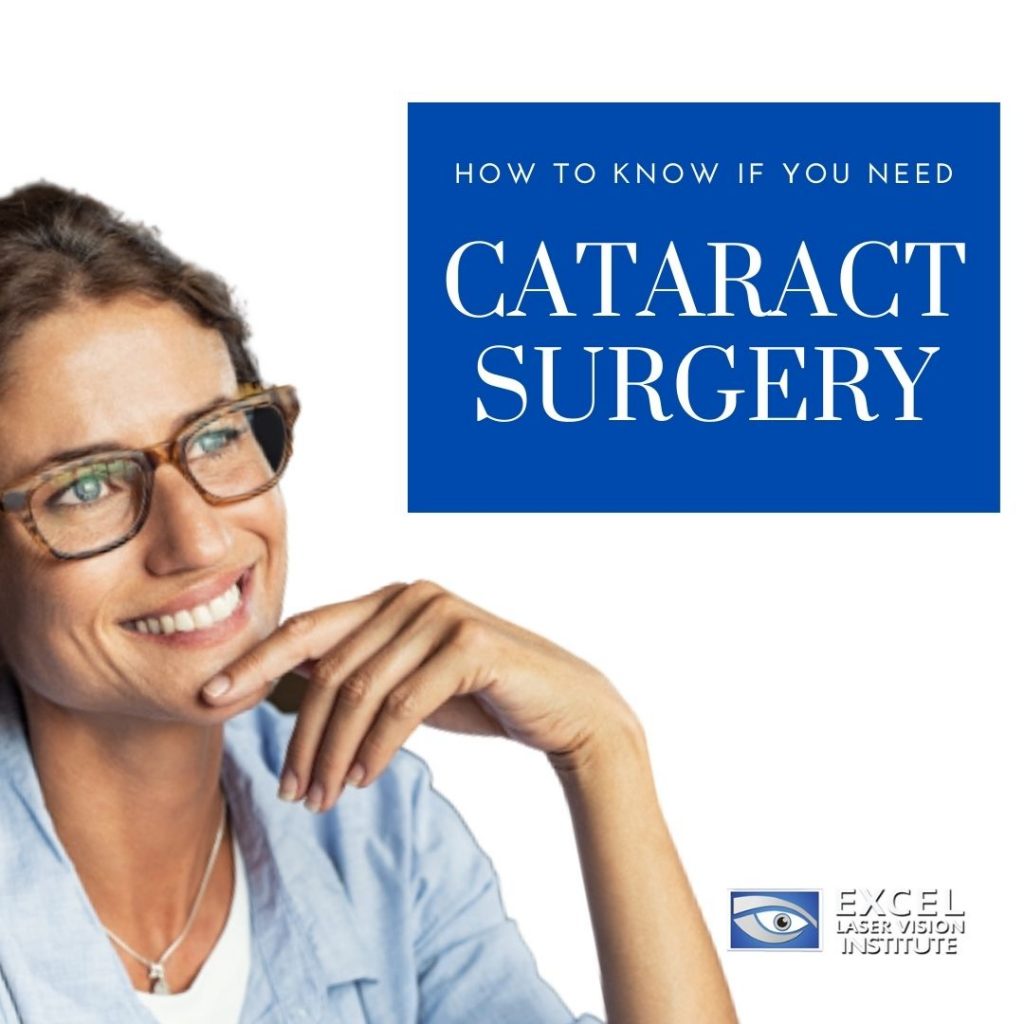
Many people develop eyesight problems over time, which is why laser vision correction procedures have gained popularity in recent decades. Whether its myopia, hyperopia, or astigmatism, LASIK has a reputation of restoring crystal clear vision to many different kinds of patients. However, cataracts are outside the realm of this corrective eye surgery and require an alternative solution. Instead of manipulating the surface of the cornea in order to allow light to better focus, cataracts are treated by replacing the eye lens completely.
As we age, our eye lenses naturally become thicker and less transparent. This can lead to cloudiness of the lens, which we know as cataracts. According to recent studies, about 50% of people will develop cataracts by the time they reach 80 years old. In many cases, cataracts develop in a slow, subtle manner. Someone may at first experience more nearsightedness and then poor night vision as well as dulled color perception. These symptoms can be evaluated by an eye doctor in order to determine if cataracts, glaucoma, macular degeneration, or any other eye conditions are the root cause.
The only effective cure for cataracts is the removal of the clouded lens through cataract surgery. Los Angeles eye doctors say that, in most cases, the procedure is recommended based on how much the cataracts are interfering with someone’s daily life. In the early stages of cataract development, vision may not be significantly impaired. However, cataracts are known to exacerbate other eye conditions like macular degeneration. The best course of action is to have a comprehensive eye exam with a professional in order to determine whether it is the right time for the procedure.
When choosing the synthetic lens implant for cataract surgery, one must speak to an eye care professional in order to hear their recommendations. Monofocal versus multifocal lenses provide different benefits, depending on the patient’s age and lifestyle. Younger cataract surgery patients often choose monofocal implants while multifocal lenses provide relief for patients with detail-oriented jobs and hobbies. The key is choosing the lens that will best satisfy your vision needs in your individual circumstances.
Frequent eye exams are the best way to ensure that your eyesight is monitored and preserved. Whether you need cataract surgery, LASIK eye surgery, or some other corrective procedure, experienced ophthalmologists can help you reach your vision goals.
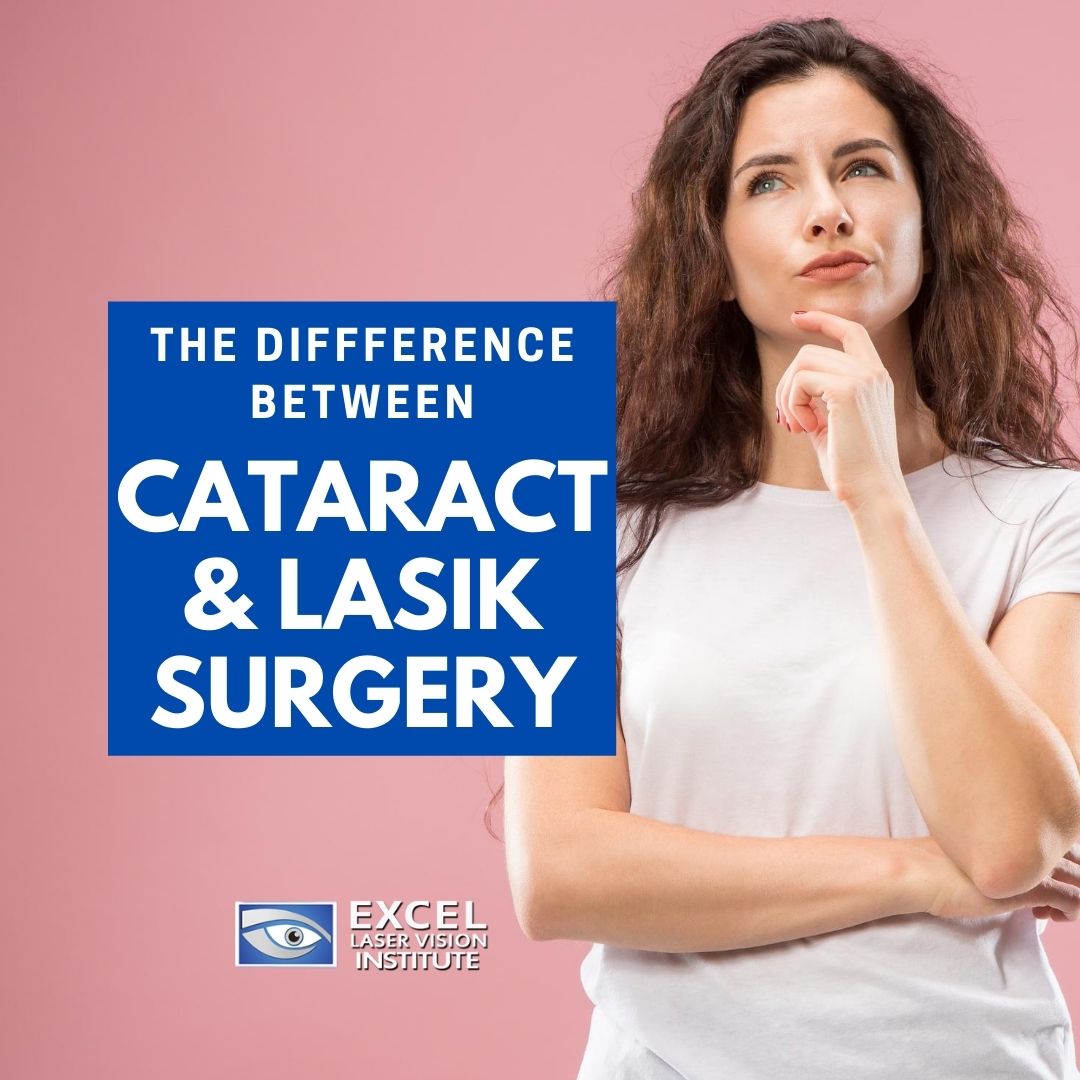
Cataract Versus LASIK Surgery
While many people have heard of LASIK and cataract surgery, there seems to be a general confusion about whether or not these two procedures can work together to achieve vision goals. Some of the confusion stems from the fact that many Los Angeles clinics offer both cataract surgery and LASIK. Many eye care patients find themselves asking how these two methods of vision correction are different from one another and if they can be utilized in tandem for certain individuals. Fortunately, the answers are rather straightforward and simply require the expertise of an eye care professional.
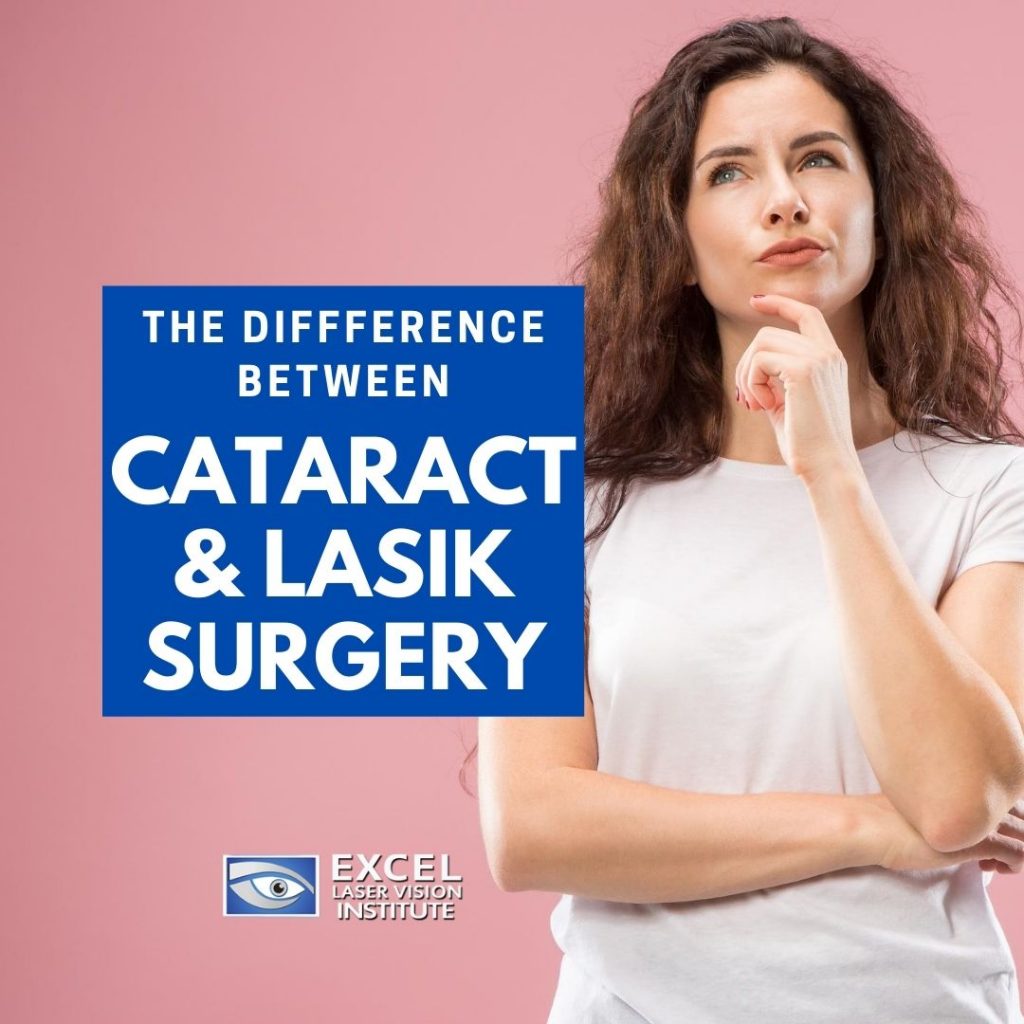
How is cataract surgery different from LASIK?
LASIK eye surgery involves the reshaping of an individual’s cornea to help refocus light properly, thus correcting a previous refractive error. Cataract surgery, on the other hand, is a treatment that involves the replacement of an individual’s natural lens, which has become clouded with cataracts, with an artificial lens (IOL or intraocular lens).
Each surgery is performed within a different timeframe. LASIK is usually a bit quicker and both eyes can be completed in the same surgery. Cataract surgery usually requires a separate day for each eye. Another difference between the two procedures is that cataract surgery can be covered by insurance (unless choosing premium add-ons) while LASIK offers a flexible savings account (FSA) but no insurance coverage.
How is cataract surgery similar to LASIK?
In the most basic sense, both LASIK and cataract surgery are a form of corrective eye surgery that require laser technology. Cataract surgery utilizes the femtosecond laser to extract the natural lens of the eye and bladeless LASIK utilizes the femtosecond laser for the creation of the corneal flap.
Each procedure seeks to improve a patient’s vision and offers a very quick recovery time. Patients who receive LASIK or cataract surgery at a Los Angeles clinic such as Excel Laser Vision Institute are typically given local anesthesia and both surgeries can be performed while patients are awake.
Can you get cataract surgery and LASIK surgery on the same eye?
The short answer is yes. Both procedures focus on different areas of the eye (the cornea for LASIK and the lens for cataract surgery) which is why this combination would not likely pose any interference. However, this answer may differ depending on a person’s specific eye condition and the recommendations of their surgeon. The best way to find out if you’re eligible for cataract surgery after receiving LASIK (or vice versa) would be to ask an eye specialist at a laser vision correction clinic in Los Angeles like Excel Laser Vision Institute.
Can cataract surgery and LASIK be used in tandem?
The answer to this is sometimes. In circumstances where an individual’s natural lens is replaced, but their visual acuity is still not at the right level, a surgeon may recommend a version of LASIK for a full correction. Usually, instead of using traditional LASIK methods, an eye specialist will perform an alternative refractive surgery called PRK.
Final Thoughts
Cataract surgery and LASIK are both vision correction methods that offer incredible benefits to certain individuals. If you would like to see if you’re eligible for either of these procedures, then you can visit the Excel Laser Vision Insitute for a full eye exam and consultation with a laser eye specialist.

Improving Motorcycling Safety with Cataract Surgery in Los Angeles
There’s no taking chances when it comes to your vision – especially not on a motorcycle. Having clear eyesight and strong peripheral vision is not only essential for motorcyclists but also for other drivers and pedestrians they encounter on the road. If you’re a rider with poor vision, LASIK and cataract surgery in Los Angeles are excellent options to improve both safety and performance.
5 Benefits of LASIK for Motorcyclists
Clear vision doesn’t just allow you to enjoy the ride; it’s a critical road survival tool. To compensate for vision problems, many riders wear eyeglasses or contacts, but the most effective, long-term solution is laser eye surgery in Los Angeles. Here are five major benefits:
- Enhances peripheral vision
Peripheral vision allows you to see what’s happening outside your direct line of sight without turning your head. It’s linked to balance, reaction speed, movement, and reduced mental fatigue in drivers. Good peripheral vision informs motorcyclists of vehicles to the sides, obstacles like oil spills or potholes, and other road conditions.
Wearing eyeglasses simply helps you see what’s in front of you, but they don’t cover your vision to the side. In contrast, laser eye surgery effectively corrects peripheral vision, so you’re always completely aware of your surroundings while staying focused on the road ahead.
- Improves night driving
Eyesight problems like astigmatism can make lights look hazy, distorted, or elongated while riding at nights. Other issues like farsightedness and myopia can create halos, glare, and reflections that make night driving dangerous. Laser eye surgery in Los Angeles has more than a 95% success rate when it comes to these vision problems, allowing you to see clearly when driving your motorcycle in low lighting conditions.
- Helps riders identify visual cues
Riders with deteriorating vision often have to strain to see far away objects such as road signs, police cruisers, and other drivers. Failing to identify these cues can make it hard to slow down when you need to and lead to a missed exit or worse, a speeding ticket or something more serious. LASIK has proven to be one of the most effective ways to improve near-sightedness so you can see far ahead and respond appropriately to any driving situation.
- Eliminates the problem of moisture hampering your vision
Laser eye surgery also eliminates a unique problem for riders who wear glasses – moisture coating their lenses when it rains. It’s natural for water droplets to form on your helmet when driving through the rain, but when you wear glasses, it adds another layer of droplets that can severely hamper your field of vision. In most cases, LASIK removes the need to wear glasses altogether and cancels out this issue.
- Offers potential big savings
A lot of people hesitate to get LASIK surgery due to the upfront investment. Over the years, however, the amount you spend on broken eyeglasses, changing prescriptions, and the stress and hassle of dealing with eyewear will add up and cost you so much more in the long run.
Still on the fence regarding the financial investment of LASIK? The good news is that LASIK financing is now widely available, which means getting your eyesight fixed for good is now more affordable than ever.
Schedule a Consultation with a LASIK Surgeon in LA
Excel Laser Vision Institute provides safe and effective vision correction in Los Angeles, Orange County, and surrounding areas in California. Talk to our trusted LASIK surgeons in Los Angeles today to determine if you’re a good candidate for this life-changing procedure.
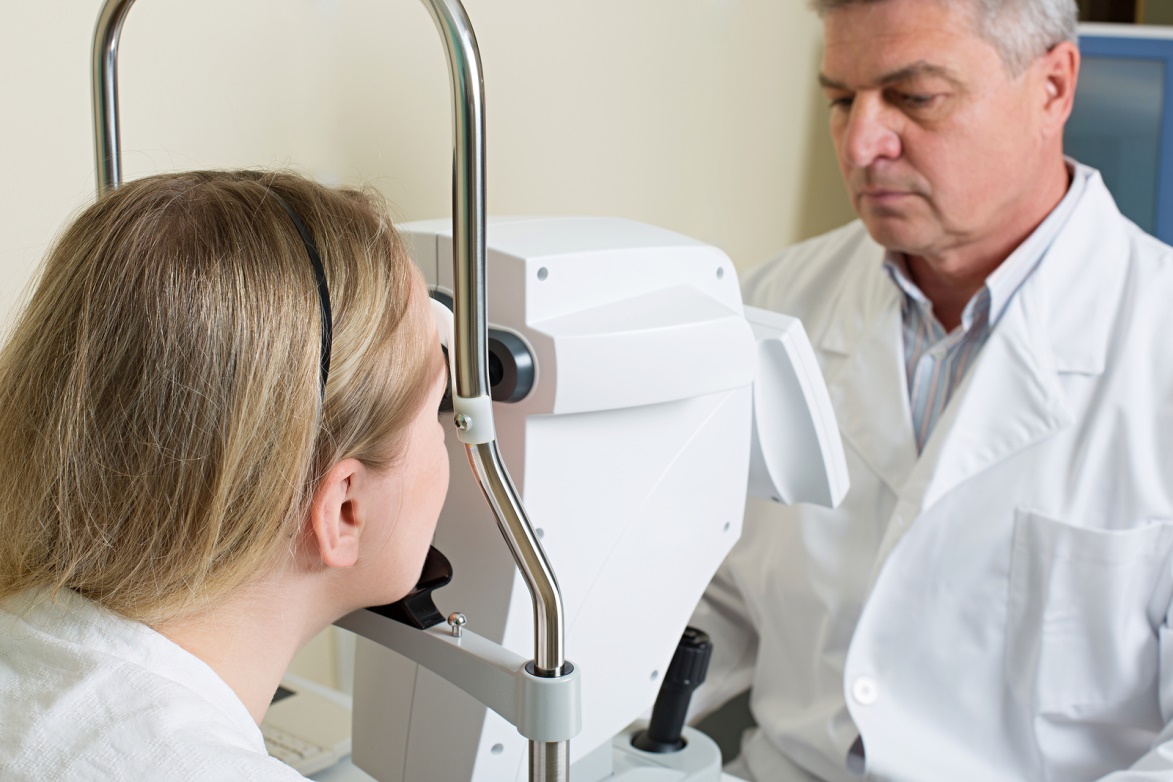
Laser Eye Surgery in Los Angeles for Parents on the Go
Beginning in the early 40s, many adults start having difficulties with their eyesight. It becomes harder to read at close distances especially while reading or working on the computer. For parents, this is more than a minor inconvenience — laser eye surgery in Los Angeles can help you run the household more efficiently, protect the people you love, and enjoy your time together more. (more…)


